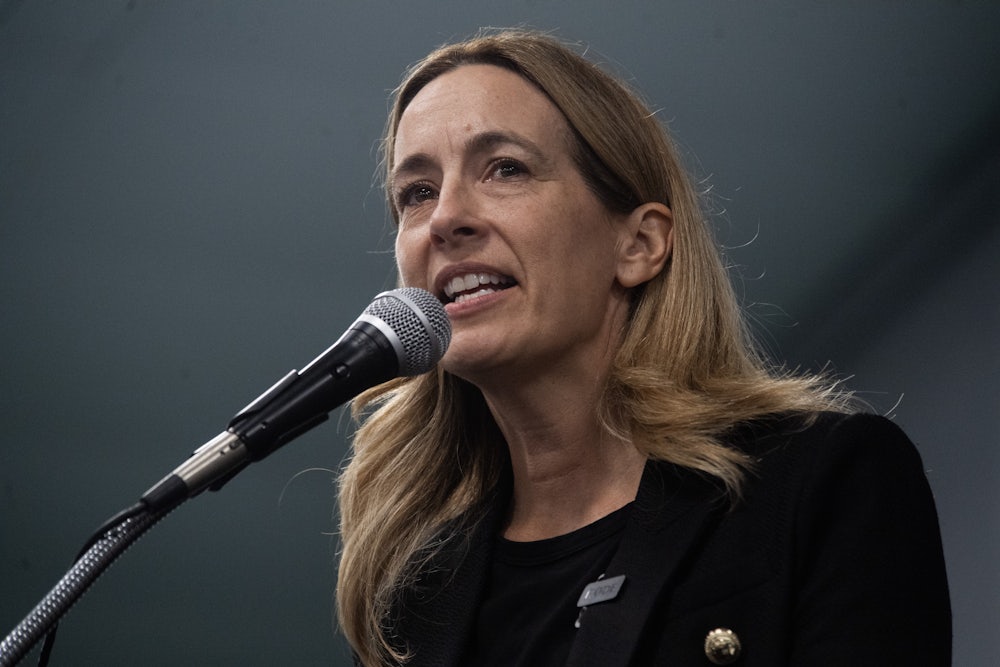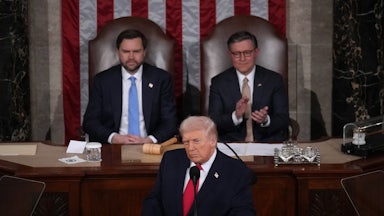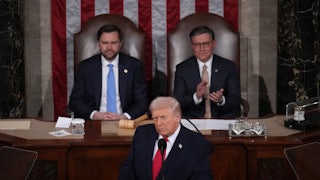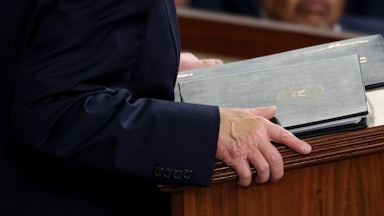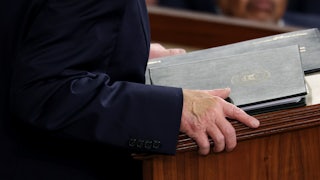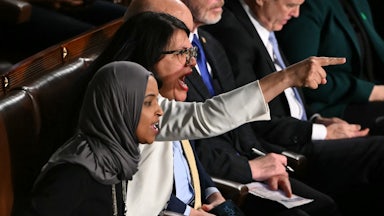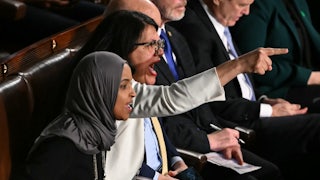In an increasingly polarized society, politicians and the consultant class increasingly find themselves worrying about how to connect with voters with calcified views. The perception of a candidate’s authenticity—that ineffable sense of genuineness that differentiates them from the hated political elite—can be more important than any particular policy platform. Authenticity is valued highly enough by voters to be critical to electoral success, but its presentation is so subjective as to be rendered functionally indefinable.
However, there is one critical aspect that benefits male candidates, while making it more difficult for women to break through: Qualities of authenticity are often implicitly connected to masculinity. Because the traditional officeholder has been a white man for much of American history, the default picture many voters have of a politician is a white man. Female politicians thus have to toe the line of fulfilling traditional gender expectations, while also trying to be taken seriously as potential leaders in a society that has traditionally marginalized them.
“It’s very hard for them to just find that sweet spot of authenticity, because they’re being pulled in very different directions to address voter expectations, whereas men—because there’s already an alignment—they arguably have some more freedom within that space,” said Kelly Dittmar, director of research at the Center for American Women and Politics at Rutgers University.
Politics is a performance, and the presentation of authenticity is no different. A September Politico profile of two male Iowa Democratic Senate candidates highlighted how the party struggles with connecting with the “average” voter, with author Michael Kruse noting that in a “political context authenticity is less (or maybe not at all?) about ideology or policy and more just some aura or sense.” But that vibe is, in turn, very dependent on specific cues. This extends to perceptions of “authenticity” in the public sphere, including depictions in the political press.
A now-controversial candidate in Maine has also been at the center of conversations on authenticity in politics. Before he became infamous for his tattoo containing Nazi imagery and his prior prejudiced Reddit comments, Maine Democratic Senate candidate Graham Platner garnered plaudits from those on the left for his bluntness and oyster-farming bona fides. A New Republic profile of Platner in August highlighted his service as a veteran, identifying his vision of masculinity without specifically mentioning gender: “He insists the Marines are full of men like him, grunts who love both the anarchic politics of Black Flag and the grinding discipline of active duty.” A recent Washington Post article dubbed three male Senate candidates, including Platner, the “Rugged Guys of the 2026 midterms.”
This kind of authenticity is embodied in a man who works with his hands, who speaks his mind, who may even wear flannel. In short, a regular guy—specifically, a regular white guy—with whom you could share a regular beer.
“The things that code authentic are—surprise, surprise—things that code masculine,” said Amanda Litman, co-founder and executive director of Run for Something, an organization dedicated to supporting progressive women running for office. Unkempt clothing can be seen in a male candidate as refreshingly unconcerned with societal norms, whereas a woman might be judged for a similar seeming lack of care in appearance. The Platner profile from The New Republic, for example, described his T-shirt and boxers; it’s difficult to imagine a woman candidate showing a similar level of informality before a reporter.
Women candidates with a background in the military or national security also have a tendency to emphasize these experiences as proof that they are able to handle the rigors of higher office. This is hardly unique to female candidates; men in politics also often use their veteran status as a shortcut to being perceived as authentic. But Litman said that the emphasis on military service or national security expertise could be seen as the “biographical equivalent” of a woman wearing a pantsuit, in that it allows candidates to “adopt traditionally masculine story structures.”
The Democratic gubernatorial nominees in Virginia and New Jersey, Abigail Spanberger and Mikie Sherrill respectively, both have a background in national security. This identity was critical during the 2018 midterm elections, which saw a wave of women elected into office. Citing Sherrill’s race, Dittmar noted that Democrats generally speaking are viewed as less tough than Republicans, so that highlighting her background in national security means she is “addressing both the partisan and the gender stereotype.”
“With Sherrill, in the same line she’s talking about being in the military, she’s usually talking about being a mom,” said Dittmar. “It’s a much more—and I’m putting this in quotes—‘traditional’ way that women have navigated these gendered expectations. Like, ‘Let me tell you both of these things. I meet the feminine expectations of being a mom of four, and I meet the more masculine expectations of toughness and strength through my military service.’”
The interplay between toughness and traditional gender expectations places an additional burden on Republican women, continued Dittmar. GOP women may need to fulfill a particular beauty standard, or emphasize their commitment to traditional gender roles, even as they work to prove to voters that they are worthy of leadership responsibilities. She cited Sarah Palin’s quote that a hockey mom is akin to a pitbull in lipstick, and Marjorie Taylor Greene’s dedication to both CrossFit and her identity as a mother.
“They’re [not only] dealing with very stereotypical expectations of women’s roles, but a party that’s really lifting up masculinity and concerned in particular about male grievance and the end of masculinity,” said Dittmar about Republican women.
Authenticity also interacts with perceptions of class. Litman noted how the “aesthetics” of masculinity and traditional perceptions of the working class are intertwined. Even though men are less likely to be low-wage workers, voters may not immediately think of professions dominated by women, and especially nonwhite women—such as teaching and nursing—as the embodiment of the working class.
Beyond class considerations, authenticity is frequently defined by the sense that a politician is telling it as it is. Donald Trump, a paragon of wealth and excess, is considered by his supporters to be authentic because he speaks his mind without consideration of causing offense. Trump also represents a very specific form of masculinity, one that values traditional gender roles; his victories against female candidates in 2016 and 2024 emphasize, in part, how an aggressive machismo is still important to voters writ large.
Even so, women politicians are also increasingly embodying honesty and bluntness, making it easier for them to also be viewed by voters as authentic, argued Jennifer Palmieri, a Democratic strategist who worked on Hillary Clinton’s 2016 presidential campaign.
As Elle Reeve wrote on these pages back in 2015, one of the biggest challenges Clinton faced as a candidate was navigating the authenticity minefield. Voters famously struggled to see Clinton as authentic in both her 2008 and 2016 campaigns; Palmieri believes that is in part because she was the first major female presidential candidate. A younger male candidate with less experience—think Barack Obama, or Beto O’Rourke, or Pete Buttigieg—is a more acceptable figure in the public consciousness.
“There was no model to compare her to, whereas an earnest young man who’s even untested is a very familiar figure to us,” said Palmieri. This does not mean that this kind of male candidate will be successful—again, see O’Rourke and Buttigieg—but voters may be quicker to take them seriously.
However, as more women are elected, it may be easier for voters to view them as authentic. Politicians like Michigan Governor Gretchen Whitmer and New York Representative Alexandria Ocasio-Cortez are lauded by supporters for speaking their mind. Palmieri believes authenticity is defined by a politician’s confidence in who they are, their comfort in presenting that persona to voters, and then voters’ ability to appreciate those qualities. As Americans have become more accustomed to seeing women in the political sphere, they are able to attribute qualities of authenticity to these candidates.
So while men may still be many voters’ default idea of a politician, as more women succeed, they give a boost of confidence to those following in their footsteps, and a greater amount of belief in their own ability to project authenticity.
“It helps if you’re second, and not the first,” Palmieri said.
